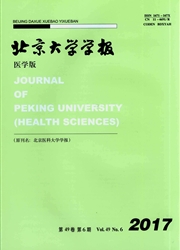

 中文摘要:
中文摘要:
牙周疾病是由菌斑微生物所引起的牙齿周围支持组织的慢性感染性疾病,包括牙龈炎(仅侵犯牙龈组织)和牙周炎(侵犯牙龈、牙槽骨、牙周膜和牙骨质多种组织),牙龈出现炎症,牙周炎时还表现为牙周袋形成、附着丧失和牙槽骨吸收、牙齿松动,最后可导致丧牙。牙周疾病是造成我国成人牙齿丧失的首位原因。近10多年来的大量研究结果表明,牙周感染还影响全身健康,是某些全身系统性疾病的一个重要的潜在危险因素,这些疾病包括心血管疾病、早产及低体重新生儿、糖尿病、呼吸道感染、胃炎、胃溃疡及类风湿关节炎等。
 英文摘要:
英文摘要:
There were increasing studies on the association of periodontal diseases with coronary heat disease (CHD) in the recent 20 years. This article reviewed the evidence supporting the association between periodontal disease and CHD, the possible mechanisms explaining the association, and the possible effect of periodontal treat- ment on the risk of CHD. In general, it is suggested that periodontal disease especially periodontitis is modestly associated with CHD. Besides there are some common risk factors, such as smoking, stress, elder age, male gender and low socioeconomic status, between these two diseases, long chronic periodontal infections by periodontal pathogens, the systemic acute-phase response and host immuno-inflammatory response to the exposures of periodontal infection appear to be the important mechanisms for connecting the periodontal disease and CHD. Periodontal treatment can decrease the infection of periodontal pathogens and therefore, reduce the systemic inflammatory burden. It was observed in some studies that periodontal treatment could reduce the serum inflammatory biomarkers such as Creactive protein and improve endothelial function. Even though the studies on effect of periodontal interfere on CHD are still limited now, it appears hopeful that periodontal treatment could reduce the risk of CHD and therefore become one of the preventing strategies for CHD.
 同期刊论文项目
同期刊论文项目
 同项目期刊论文
同项目期刊论文
 期刊信息
期刊信息
